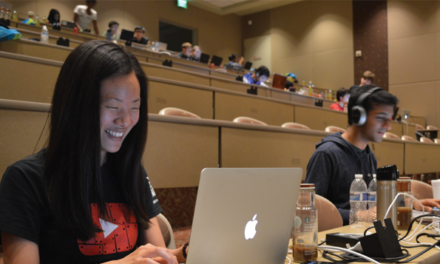Dear Aunt Amy,
I went through a practice round of recruitment this past weekend, and I am really nervous for an entire week of Formal Recruitment. Everyone seems to be able to talk so easily to other girls, but I don’t know what to do! I’m not terribly outgoing and have a hard time making small talk. Are there things that I should stay away from? Or do you have any suggestions for topics to bring up? I feel very awkward around all these girls who seem so chatty and confident. What makes for a good, memorable conversation?
Sincerely,
Feeling Nervous
Dear Feeling Nervous,
Being able to hold a great conservation is a powerful weapon that most people do not utilize to its full potential. A conversation provides you with the opportunity to express yourself in any way possible, as whoever you want to be. One of the most important things when talking to someone is your body language. In order to hold a polite and meaningful conversation, you must remember to make eye contact. Whatever you do, do NOT look at your feet! Make sure to hold yourself well by sitting or standing up straight, without slouching. When speaking to someone, it is important to enunciate well, by pronouncing each word’s syllables. This is especially pertinent when you are in a loud environment, like during recruitment.
I am so glad that you mentioned controversial subjects and things that should not be brought up in conversations! Too many people these days forget that certain subjects are taboo. In terms of recruitment, you should try to stay away from the five B’s: Boys, Booze, Barack (politics), Bible (religion) and Bank (finances). I would say that these are generally good guidelines for any kind of conversation. People of this generation have become scared of any sort of silence and seem to think that it is the worst thing to happen in a conversation. It is okay to not be talking for an entire conversation, particularly during recruitment. The girls in sororities will want to know about you personally and not just the other way around. If you don’t know the answer to something, it is completely acceptable to say, “I don’t know.” As I used to say in my heyday, taking from Abraham Lincoln, “It is better to remain silent and appear stupid than to open one’s mouth and remove all doubt!” Can you imagine what the world would be like if people followed this advice? Some politicians should really take this advice to heart!
Regarding conversation topics, it’s a great idea to go into any social setting where you will be having a lot of conversations with a few ideas for what you might discuss. People are always interested in learning about where you come from, so preparing a small description of your background is always a good idea. There is always room to talk about academia and what you are involved with on campus. Another great segue into conversations is to ask what people actually want to do with their degree. A degree can end up being very versatile in the post-graduate world, and you can learn a lot about someone by hearing this information. My final suggestion is to find something interesting or funny about yourself to have up your sleeve. This will distinguish you and make the conversation memorable and lighthearted. This could be anything from a cool place you have traveled to, to the weirdest injury you have had. Most importantly, just think of things you are comfortable talking about, and you will enjoy your conversations!
Best of Luck,
Aunt Amy
Aunt Amy is named after one of the first female graduate students at Emory University. Aunt Amy attended Washington Seminary in Atlanta, and was in the same class as Margaret Mitchell, the author of Gone with the Wind. Aunt Amy grew up on her family plantation in Georgia.
The Emory Wheel was founded in 1919 and is currently the only independent, student-run newspaper of Emory University. The Wheel publishes weekly on Wednesdays during the academic year, except during University holidays and scheduled publication intermissions.
The Wheel is financially and editorially independent from the University. All of its content is generated by the Wheel’s more than 100 student staff members and contributing writers, and its printing costs are covered by profits from self-generated advertising sales.






